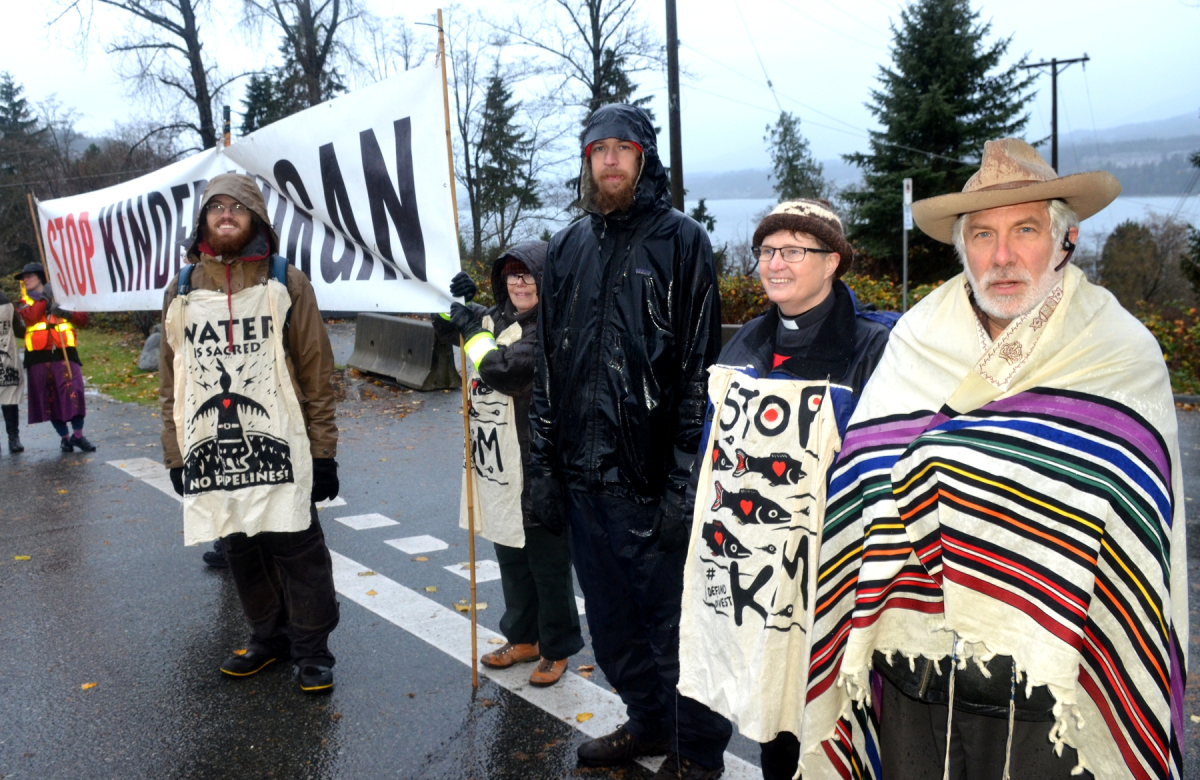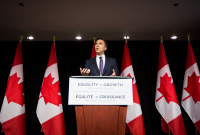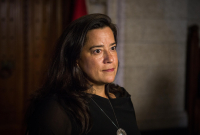Support strong Canadian climate journalism for 2025
Saskatchewan's former premier offered rare praise for the federal government Wednesday, as well as hard questions for the future of the Trans Mountain pipeline expansion as British Columbia Premier John Horgan's government continues to challenge the project.
Speaking to reporters in downtown Vancouver, Brad Wall praised Finance Minister Bill Morneau’s announcement earlier in the day that Canada will be prepared to protect the oil pipeline expansion from any financial losses. But he quickly raised doubts about how many millions of dollars Ottawa was ready to dole out.
“How long will taxpayers be on the hook for this?" Wall asked.
"If Premier Horgan is still the premier in two, three, four years, do you think his position on Trans Mountain is going to change? I don’t think so. So, how long will these funds come from taxpayers?”
Ottawa's pledge to commit money to the controversial $7.4 billion pipeline project came a month after the proponent, Texas-based Kinder Morgan, announced it would halt all non-essential spending on the project in light of the uncertainty caused by British Columbia’s opposition to the project. Kinder Morgan threatened to scrap the project entirely if disagreements couldn't be resolved by May 31.
Wall was recently hired as a special adviser at a Calgary law firm reported to have ties to Kinder Morgan.
On Wednesday he said that while costs to taxpayers was an issue, the federal government's announcement showed how seriously Ottawa is taking the pipeline.
“I think today’s development is by and large — and I reserve some comment because I want to see the details — an indication that the feds are prepared to act,” he said.
“So for those of us who want to see the pipeline built because we think it’s in the national interest, we should acknowledge that this (the Trans Mountain pipeline expansion) is a priority for them.”
Wall has been a vocal critic of the federal government’s position on Kinder Morgan in the past, calling their stance “weak”. While he is cautiously applauding this move by the government, he believes it’s a last resort that could have been avoided if some stronger positions were taken.
“This federal government is prepared to say to my province you don’t get your $60 million of low carbon infrastructure dollars cause you won’t sign on with the carbon tax,” said Wall, referring to Ottawa’s efforts to impose a carbon tax on Saskatchewan.
“Where was that stance with B.C.? They just signed a $4-billion infrastructure deal with B.C. like weeks ago. Why wouldn’t the government say, 'You are eligible for this $4 billion, but maybe that cheque gets lost in the mail until you cooperate with a federally approved pipeline.'”

Horgan says federal government is putting 'taxpayer money on the line'
While speaking to reporters in Ottawa Wednesday, Morneau gave few details about the plan to protect the project, saying that the federal government is prepared “to indemnify the project against any financial loss that derives from Premier Horgan's attempts to delay or obstruct the project."
But Horgan shot back in a statement, saying Ottawa was rushing a matter that was now being decided in court.
“The federal finance minister is trying to use our government as an excuse, as the federal government puts taxpayer money on the line to backstop risks to private investors, while completely ignoring the risks to B.C.," Horgan said. "The fact is, we’ve been issuing permits in a fair and timely manner, and have proposed new regulations that are now referred to court to confirm our jurisdiction."
For David Mivasair, a Vancouver-based rabbi and one of the many protesters who has been physically standing on the front line of the opposition to the Kinder Morgan expansion, the federal government's announcement was further proof that the project should not be moving forward.
“Our tax money should not be funding this project,” said Mivasair, founder of the grassroots Justin Trudeau Brigade who staged numerous blockades at the Kinder Morgan’s Westridge Marine Terminal in Burnaby. “If Kinder Morgan can’t raise the capital in the open market because people who manage investments judge this to be a bad risk, the government of Canada should not be stepping in to save them with our money.”
Projected costs for the expansion have ballooned from the initial $5.5 billion in 2013 to $7.4 billion in 2017, with that number expected to rise again. Currently, Kinder Morgan Canada needs to raise more than $2 billion in equity, which has led some, including economist Robyn Allan, to see Kinder Morgan’s April 8 announcement as a cover-up for financial challenges.
Ever since the B.C. Supreme Court granted an injunction to Trans Mountain that prevented people from entering within five metres of the two work sites, Mivasair and his team have stopped physically protesting, but he says that all can change.
“If they think this work is going to go ahead, we are going to have to start that up again,” said Mivasair. “The government can take our money, but they can’t force it (the expansion) through if the people here don’t want it.”
The Trans Mountain expansion has seen both support and opposition since it was approved in November, 2016.
The project would see a twinning of the existing pipeline, increasing its capacity to 890,000 barrels of diluted bitumen a day. According to Trans Mountain’s website, the expansion is expected to add $73.5 billion in revenues over the next 20 years for Canada and create 37,000 jobs. However, the project faces significant opposition, including legal challenges from some B.C. communities and First Nations who say an expanded oil pipeline would bring unacceptable risks to the coastline and push Canada's climate goals out of reach.






Comments